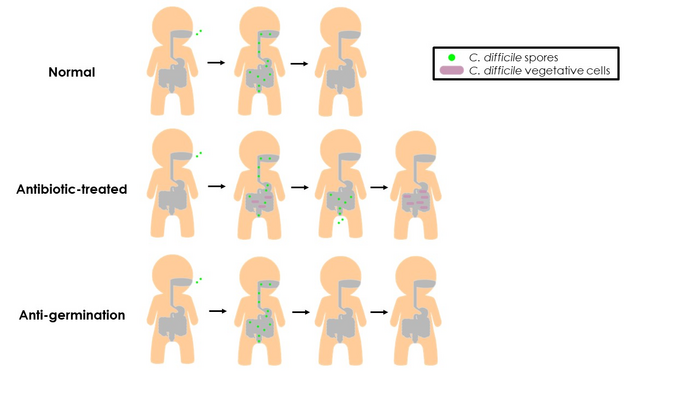Each year, about 500,000 people in the U.S. deal with gastrointestinal infections from Clostridioides difficile (C. diff), and more than 20,000 die from these infections. A new study performed in mice has identified a compound that prevented C. diff infection caused by multiple strains of the bacterium, including those that cause serious illness. Researchers are now using this compound to develop new drug candidates that might eventually offer a way to prevent serious C. diff infections in people.

Credit: Jacqueline Phan, University of Nevada, Las Vegas
Each year, about 500,000 people in the U.S. deal with gastrointestinal infections from Clostridioides difficile (C. diff), and more than 20,000 die from these infections. A new study performed in mice has identified a compound that prevented C. diff infection caused by multiple strains of the bacterium, including those that cause serious illness. Researchers are now using this compound to develop new drug candidates that might eventually offer a way to prevent serious C. diff infections in people.
C. diff infection causes life-threatening diarrhea and is usually a side effect of taking antibiotics. Only two major drugs are approved to treat this, both of which are antibiotics that are administered only after the infection has taken hold.
“C. diff infection is quite a burden to the U.S. healthcare system, costing $3 billion to $4 billion annually,” said Jacqueline Phan, a chemistry doctoral student in the lab of Ernesto Abel–Santos, a biochemistry professor at the University of Nevada, Las Vegas. “Our research aims to create a preventative drug that could be used to treat susceptible individuals before the infection starts, instead of treating patients only after they display signs of the infection.”
Phan will present the new research at Discover BMB, the annual meeting of the American Society for Biochemistry and Molecular Biology, March 25–28 in Seattle.
“Some of the new compounds we have developed provide multiday protection in mice from just a single dose,” said Abel–Santos. “What’s more, we found that these compounds appear to move in a loop between the liver and the intestine, which means that the liver is enabling a slow release of these compounds to the gut.”
One reason that C. diff is so successful at infection is its ability to form dormant spores that can survive on surfaces or in the gastrointestinal tract. Only when the spores reach the nutrient-rich intestinal lumen will they germinate, turning into cells that cause symptomatic infection.
“Anthrax is another well-known spore-forming type of bacteria,” said Abel–Santos. “After the anthrax attacks in 2001, I started thinking about how these spores — which are basically specks of sand — detect their environment and start the germination process that returns them to a normal living organism. I realized that targeting the germination process could be a way to prevent infectious diseases such as C. diff.”
To find a way to inhibit C. diff germination, the researchers took advantage of the fact that the optical properties of a spore change when it starts to germinate. This let them test hundreds of different compounds by measuring the optical density of the spores after incubation with one of the compounds. Compounds that inhibited spore germination at very low concentrations in the micromolar range were further evaluated in a mouse model of C. diff infection, which identified the aniline-substituted bile salt analog CaPA as the best candidate molecule.
Although CaPA worked well, it isn’t stable enough to survive in the gut long enough to be used for prevention. Thus, the researchers developed a new generation of compounds that are similar to CaPA while being more stable. They are now studying how the liver modulates the dosages of these compounds to see how this affects the gut microbiota. “This is something that has not been studied before,” said Abel-Santos. “It might be possible to use the patient’s own liver as part of the treatment plan.”
The researchers also noticed differences in C. diff infection severity that were related to both diet and sex and observed that severity in female mice appeared to correlate with the estrous phases of the previous day. Based on these findings, they are examining how diet can affect the gut microbiota and, in turn, C. diff infection and how the estrous cycle may also modulate outcomes in mice.
Jacqueline Phan will present this research during a spotlight session from 2–3 p.m. PDT on Sunday, March 26, in Room 6B of the Seattle Convention Center (abstract). Contact the media team for more information or to obtain a free press pass to attend the meeting.
Image available.
This research was supported by the National Institutes of Health grant R01AI109139, GM103440 and GR08954 and NASA Nevada Space Grant NNX15AI02H.
About the American Society for Biochemistry and Molecular Biology (ASBMB)
The ASBMB is a nonprofit scientific and educational organization with more than 12,000 members worldwide. Founded in 1906 to advance the science of biochemistry and molecular biology, the society publishes three peer-reviewed journals, advocates for funding of basic research and education, supports science education at all levels, and promotes the diversity of individuals entering the scientific workforce. www.asbmb.org
Find more news briefs and tipsheets at: https://discoverbmb.asbmb.org/newsroom.
###




